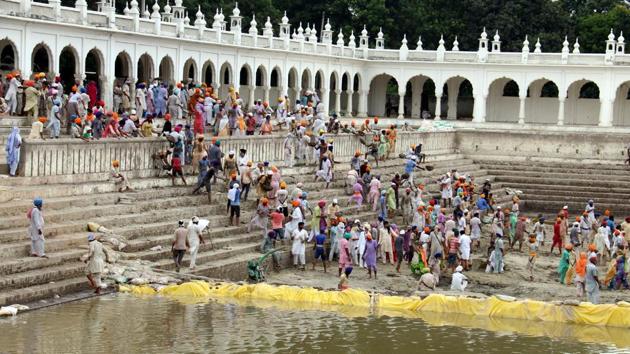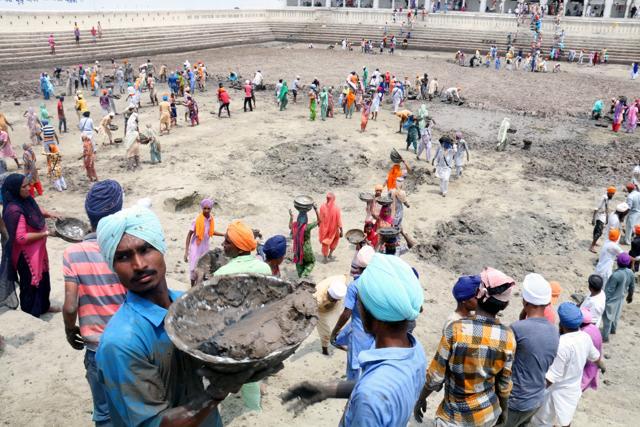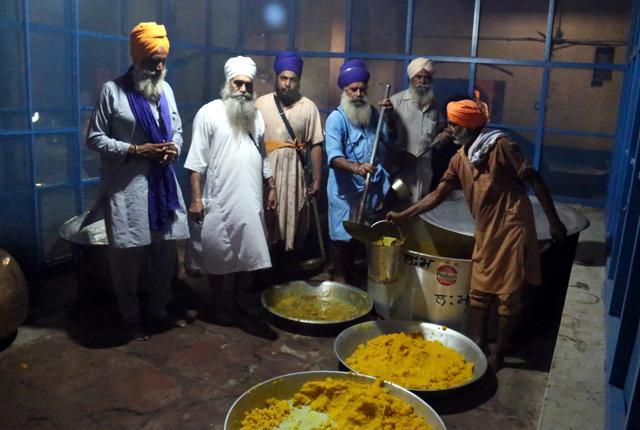59 yrs on, cleaning the holy pond again: Gurusar Sarovar kar sewa in Talwandi Sabo cuts across divides
The sarovar was built by Guru Teg Bahadur and later developed by Guru Gobind Singh in 1705. On its banks is where Guru Gobind Singh, the tenth Sikh guru, prepared the full version of Guru Granth Sahib.
Thousands of devotees from across Punjab and other places are reaching Talwandi Sabo everyday for kar sewa (voluntary service) to clean Gurusar Sarovar at Takht Damdama Sahib, one of five temporal seats of Sikhism. The 22 feet deep pond spread over five acres was last cleaned in 1958, so that task is massive. On the first day of the desilting and repair operation on Wednesday, nearly 50,000 people reportedly took part.

The sarovar was built by Guru Teg Bahadur and later developed by Guru Gobind Singh in 1705. On its banks is where Guru Gobind Singh, the tenth Sikh guru, prepared the full version of Guru Granth Sahib here. Due to his literary activities, the place is also known as ‘Guru ki Kashi’, in a reference to Kashi, present-day Varanasi in UP, a historical seat of knowledge.
The sarovar was attached with a canal in 1913 on the directions of Maharaja Yadavindra Singh of Patiala for regular water supply. Bunga Mastuna Committee, which maintains the pond, had called for the kar sewa.
Chhatar Singh, secretary, sevak jatha (volunteers’ group), Bunga Mastuana Committee, said more than 50,000 people reached for the kar sewa on Wednesday. The committee has divided the pond into two parts, one of which has four feet of water so that the fish are safe. “Half of the pond was cleaned by the devotees in two days,” said Chhatar Singh on Friday, adding that the people had reached the place as early as 4 am. “The whole operation will take a month as stairs of the sarovar and foundations of the buildings adjoining the sarovar will be repaired too.”

Spirit of inclusion
At the site, people from across the religion and caste divide were seen involved in the work. Teachers, policemen, farmers, masons, cobblers could be seen lending each other a hand. No gender bias is seen too. Parkash Kaur, a retired teacher who was on the cleaning job, said, “Sikhism believes in equality, and kar sewa is a perfect example of it. No one asks about anyone’s caste or social status. Even very well-off people can be seen carrying the silt.”
Silt taken home
Devotees from villages nearby are taking away some of the silt extracted from the pond. Rajinder Singh, one such devotee, said the black silt is good for farms as manure. Some even keep the silt at their homes as they consider it sacred. Innumerable ‘dupattas’, turbans, kirpans and other items were found from the bed of the pond. Jaskaran Singh, another worker, said people immerse belongings of their loved ones after their death. A shell of a hand grenade was found too, and was handed over to the district police by the gurdwara authorities.

Large langar
To feed the devotees, hundreds of volunteers, primarily women, also perform sewa in the community kitchen as langar is prepared at the gurdwara. Ram Singh, who works at the kitchen, said 2,000 litres of milk for kheer, 2,000 kg white pumpkin, 800 kg of dal (lentils) and 70 kg cheese was used on Wednesday. He could not tell the consumption of flour and rice “as no one measures the quantity consumed”. The items come in large quantities as donation too.





